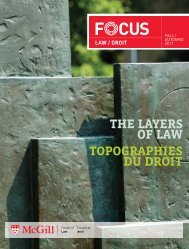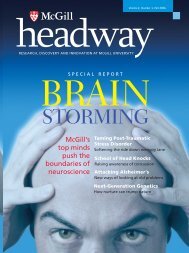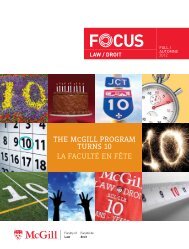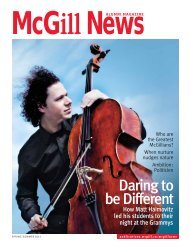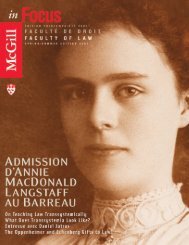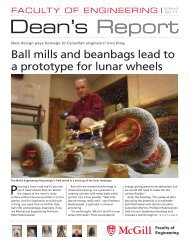McGILL'S FACULTY OF LAW: MAKING HISTORY - Publications ...
McGILL'S FACULTY OF LAW: MAKING HISTORY - Publications ...
McGILL'S FACULTY OF LAW: MAKING HISTORY - Publications ...
Create successful ePaper yourself
Turn your PDF publications into a flip-book with our unique Google optimized e-Paper software.
HUMAN RIGHTS AND LEGAL PLURALISM<br />
In an era of globalization and post-colonial<br />
self-determination, the protection of<br />
human rights remains one of the most<br />
pressing concerns around the world. At<br />
the Faculty, this is reflected both in a<br />
flourishing of teaching and research and<br />
in a student body that is deeply engaged<br />
in defending civil liberties and justice.<br />
McGill’s Centre for Human Rights<br />
and Legal Pluralism is a nexus of<br />
interdisciplinary research, dialogue<br />
and outreach. Through the work of its<br />
members, the Centre brings to light<br />
the importance of multiple legal orders,<br />
ethical inquiry, local knowledge and<br />
social power within civil society. As René<br />
Provost, the Centre’s director, explains,<br />
“Every day, our students and scholars<br />
engage critically with some of the most<br />
compelling social challenges of our<br />
modern era. They contribute to meeting<br />
the challenge posed by the disregard for<br />
human rights around the world.”<br />
LA JURILINGUISTIQUE ET<br />
LE DROIT COMPARÉ<br />
L’économie mondiale actuelle requiert<br />
des individus multilingues et cosmopolites<br />
capables de diriger nos institutions<br />
publiques, privées et à but non lucratif,<br />
et de relever les défis de la mondialisation.<br />
Qui plus est, les lois bilingues du Canada<br />
et du Québec constituent un terrain tout en<br />
nuances qui nécessite des juristes pouvant<br />
passer d’une langue à l’autre avec finesse.<br />
Certains des outils qu’emploient<br />
justement les juristes pour démêler<br />
les subtilités du droit sont produits par<br />
le Centre de recherche en droit privé<br />
et comparé du Québec (CRDPCQ). Les<br />
gouvernements du Québec et du Canada<br />
consultent ouvertement le CRDPCQ pour<br />
piloter des programmes de réforme du<br />
droit, particulièrement en ce qui a trait à<br />
la codification, au droit comparé et aux<br />
questions de droit et de langue. Comme<br />
le rappelle le directeur du Centre,<br />
Lionel Smith : «Paradoxalement, notre<br />
compréhension d’un système juridique<br />
se raffine quand on l’examine depuis la<br />
perspective d’un autre, tout comme on<br />
se comprend mieux à travers le regard<br />
de l’autre. C’est là tout l’attrait du droit<br />
comparé. À McGill, nous bénéficions<br />
de multiples perspectives, car notre<br />
environnement n’est pas seulement<br />
bijuridique, mais aussi bilingue.»<br />
INTELLECTUAL PROPERTY <strong>LAW</strong><br />
AND POLICY<br />
With technological advances being<br />
announced daily, the percentage of wealth<br />
held in real and personal property is fast<br />
being overtaken by the percentage of<br />
wealth held in intellectual property (IP)<br />
assets. As rapid innovation creates new<br />
assets and opportunities for wealth,<br />
there is a rush to protect them through<br />
copyrights, trademarks and patents.<br />
As Centre for Intellectual Property Policy<br />
(CIPP) director Wendy Adams explains,<br />
“the landscape of IP law is shifting rapidly,<br />
and policy-makers don’t always have<br />
sufficient information to fully grasp<br />
the ramifications of their decisions, or<br />
to examine how the law allocates these<br />
assets, allows fair use and so forth.”<br />
This is where the CIPP comes in. Through<br />
its work, the CIPP offers useful policy<br />
To find out more about the Faculty of Law’s priorities,<br />
visit our website at www.mcgill.ca/law/alumni or contact<br />
Toby Moneit-Hockenstein, Director of Development,<br />
at 514-398-6611 or toby.moneit@mcgill.ca.<br />
options to governments, the business<br />
community, researchers and developing<br />
economies. The CIPP also provides<br />
training in IP and IP management in<br />
developing countries to help increase<br />
their economic sustainability. It also<br />
encourages a global conversation about<br />
how IP law and policy can foster<br />
creativity, innovation, cultural growth,<br />
health, sustainable development and<br />
access to information.<br />
INTERNATIONAL<br />
TRANSPORTATION <strong>LAW</strong><br />
Transportation breaks down barriers,<br />
integrating disparate cultures and<br />
economies. Our transport networks<br />
are the circulatory system of a living,<br />
breathing globalized world, creating<br />
interdependence and stability among<br />
nations. This new global business<br />
milieu calls for legal practitioners,<br />
scholars, policy-makers and judges who<br />
can address complex legal problems<br />
from various perspectives, legal systems<br />
and languages.<br />
McGill’s Faculty of Law is wellpositioned<br />
to help shape global norms<br />
in international transportation. The<br />
Institute of Air and Space Law and its<br />
research centre are educating the next<br />
generation of specialized lawyers and<br />
producing groundbreaking research in<br />
transportation. Meanwhile, the Faculty’s<br />
maritime law program is headed by<br />
Professor William Tetley, one of the<br />
world’s foremost authorities in the field,<br />
and is a magnet for researchers and<br />
students interested in maritime trade,<br />
mobility and enterprise.<br />
<strong>FACULTY</strong> <strong>OF</strong> <strong>LAW</strong> FALL 2008 15



